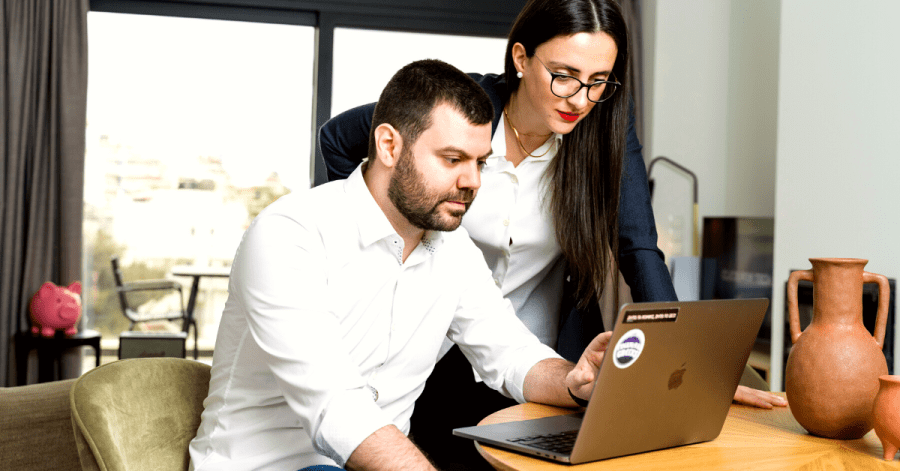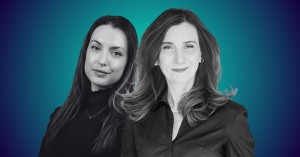Handling multiple businesses at once, using tech like a true digital native, educating oneself on personal finances, and seeking freedom in everything possible. These are prevailing characteristics of the young generation, as well as of The Recursive’s new interview guests. We talked to Christos Tsounis and Ioanna Fotoupoulu, YouTubers with 100K+ followers from Greece, who educate young people on personal finances. Apart from having their individual channels, Chris and Ioanna have recently started a project called Financial Europeans, where they support financial influencing projects by helping YouTube influencers with sponsorship for their videos.
The Recursive: Ioanna, with your background in politics, how did you start educating young people on finance?
Ioanna Fotoupoulu: Well, it’s kind of funny now because my first degree is engineering. I studied for five years to become an engineer at the Aristotle University of Thessaloniki, and from the very first semester, I knew that this is not the path for me. I started trying to find out what was the thing that actually made my heart skip a beat, what made me happy, and I ended up in entrepreneurship.
Failure after failure, I realized the thing that was missing throughout my whole journey was the finance part. I was good at finding funding but I was not good at allocating it in a viable way that would enhance the performance of my companies. This is when I realized that I need to take a step back and have my Master’s in Economics and Politics. It was a very interesting journey that taught me a lot and actually gave me an idea on where I wanted to go next in life.
I thought that an economics degree is good, but you also want to be financially independent and actually feel that you are free. Freedom is the thing that I value the most in my life. Plus, there were other things regarding finance that made me curious and they were not in the curriculum, so I started learning more on my own. I also realized that the majority of young people do not get this education, so I thought it would be cool to give back eventually.
I spent two and a half years before I started my own channel, following other people, mathematicians, economists, their journey and what they had to share, so this is how I really learned. A lot of YouTubers from Greece and abroad helped me in that journey of financial independence. Chris, who at the time had already built a pretty big channel, was one of them.
Chris, what does your story look like?
Chris Tsounis: I started my first startup when I was 19. So I went into the entrepreneurial aspect, learned how to budget, manage money for my companies. This later on transferred to my personal finance, so it was a bit different from how most people start.
The other thing is when you run your companies, you need to be much more flexible with your finances, because you don’t know exactly when the next paycheck is, how it’s going to be next month, or next year. So I gradually started handling my personal finances differently.
Then I realized that in order for me to move forward, the next step would be to actually invest outside of my companies, as well, and that’s how I started with the stock market.
The reality is that I was watching international YouTubers on how they monitor money and how they handle certain situations. Yet I lacked Greek content, not just in terms of the Greek language, but in terms of understanding the Greek market, the Greek reality, which is totally different from the US, for example, where most of the financial content came from at the time. That’s how I decided that I will become the biggest financial content creator in Greece.
My financial channel was already growing and I wanted to create an ecosystem, and not just one big channel. I wanted to bring together as many financial creators as possible in Greece. I called the project Financial Greeks and that’s how I approached Ioanna, and other YouTubers in the beginning. When I got to actually understanding what she’s doing, apart from finance, her influencing aspect, I proposed to join forces and create something even bigger.
Ioanna: You can make a lot of money doing this, but Chris is building a legacy. This is the reason why I said yes. And this is the reason why we’re building Financial Europeans, because he didn’t simply want to have fun being a YouTuber. He wanted to be a person that actually helps the new generations of Greeks to be financially stable and independent.
How do you build such a big followership on this topic?
Chris: I have been very lucky to work with Ioanna because if you want to go fast, you go alone, but if you want to go far, you need to have the right people with you. She is that type of a person that can scale things and can bring even greater impact, especially to the female audience. Ioanna helped bring even more women into the financial world, which is very important.
Ioanna: At first, I had this very naive idea of how we can build this ecosystem. I was thinking about collaborations, fun content. I was thinking of out-of-the-box videos. And then working with Chris, I realized that there is one and only one way to build such an ecosystem in a solid way and it is automation. This is how you build anything to be honest.
Chris: There’s a misconception that people don’t want to follow finance. They don’t want to follow the terminology and difficult ways of the old way of doing finance. What we did is just simply translate to a common language what economists say in difficult ways. The first thing was to simplify things and translate them into a language that people can understand.
The second thing is how you scale which comes with automation. It is why we are now able to create more than 20 hours per week of content that are specifically focused on personal finance, investing, and other ideas on how the market operates. It would be very hard to create enough content and also to manage so many people and so many different creators in different countries.
In this topic, the difficult aspect was that back in the time the only people you would talk to about finance were banks, your accountant, so people that cannot necessarily relate to what you’re going through. We’ve been successful in growing channels of 10,000 people because we became relatable. To be honest, at the beginning, Ioanna was looking for big projects like having us talk to some important figures, how we can have the best cameras or the best cinematography, but people did not need that. People just wanted to relate to us. When we shoot with our phones, which we still do, we’re trying to speak to them as if we were at the same table, discussing, explaining some things, and nothing more.
How do you differentiate good quality financial content from bad one?
Ioanna: We have a streamlined procedure. This is why automation is important to us because this way we can do our due diligence and provide good quality content. As a creator, I start doing my research and choose the topic I want to talk about. Then we have specific people, our screenwriters, who take my bullet points and do thorough analysis. It can take up to a week to find all the necessary info and put it into a script. And then I go and check the script again, check all the sources in order to see if things are good to go. As sources, we often use CIA World Factbook, statistical analysis platforms in Greece and in Europe, European Commission. We check out information from Greek public authorities, as well as professional traders, investment bankers, and other professionals in the industry.
And what would you suggest to the younger generation in how they should identify good quality content?
Chris: A good note is that when someone has very big claims of what they can achieve, I tend to be a bit more cautious. I strive for simple strategies that follow the median of the markets. If someone claims that they can beat the market consistently, I’m very very cautious.. Extraordinary claims require extraordinary evidence.
How would you overall rate financial literacy of the Greek youth?
Ioanna: The craziest part is that we receive so many questions, both me and Chris, and the whole community in general, from young people that are 14-17 years old. They’re asking us about ETFs, or to elaborate on some other topics. It amazes me because when I was 13 years old, I was watching Mexican TV shows. Of course, it’s not legal in Greece for them to do anything but what we’re telling them is that if you’re thinking like this when you’re 13, you will be ready by 18, and by the time you’re 40 you will be able to retire.
I mean it’s not like 90% of the population now want to manage their finances in a sustainable way. However, year after year, we see more and more young people trying to engage, think about their future, and not just trying to see how they can earn 700 euros today, so that they can spend 700 euros by the end of the month. This makes us think about what we’re doing, that we’re moving forward and that this area is actually getting improved.
Chris: Generally, I’m not 100% sure if this generation is improving their finances, or I’m just more in touch with people who are interested in this topic. One certain thing is that due to technology, we are much closer to the younger audiences. Neobanks, payment systems, all those kinds of things, have brought the younger generation closer. Back when we wanted to do it, we were like 20 years old, you more or less had to do it manually. Now there are automated processes, apps on your mobile that do it for you. This has also to do with the aspect of gamification that brings people even closer to financial independence.
So if I had to sum it up, it would be that yes, younger people are getting more involved with their finances. They’re more exposed to that kind of information through social media, like Tik-Tok shorts, and we, as the community of financial influencing creators, use those platforms to reach out to the younger audiences. That really leaves an impact in the long-term.
Talking about Tik-Tok, what can be learnt from a 30-second video?
Ioanna: I don’t think you can learn anything from a one or three-minute video but what helps is that you are able to judge if a piece of content is good or interesting for you really fast. That has the competitive advantage.
For us, one of the best things about Instagram or YouTube shorts and Tik-Tok is the fact that you can reach an audience that will not search for you otherwise. You show up on their phone with a totally different way of approaching our more traditional YouTube algorithm with the longer-form content. It is a very nice way for people to have a taste of a subject.
Generally, short forms of content work as a teaser for those who are interested. It saves you time on what you want to learn because let’s be honest, there is so much info out there that you cannot learn everything. If you want to just have a broad idea of something, you don’t need to go and read books or articles, it will provide you with all the necessary info and in an entertaining way.
Usually, with short form content, I mention a topic to people and if they get genuinely interested in it, they go to my YouTube channel and learn more.
Books, influencers, what else or who else do you trust with information on managing personal finance?
Chris: I do not trust anything more than books. For me, books are the number one item. This has come after the years of my formal education. While I was studying in the university and doing my master’s degree, I learned how to learn and how to teach myself. After you’ve been through that process, then the next thing for you is to keep on learning by reading books, blogs, and watching influencers on YouTube.
Ioanna: I really agree with Chris on that. For me, books are the start and end of anything I want to learn. But if I didn’t go to school, most likely these books would not have given me this much as they do now. For me, books, as well as learning from other people works. I like theory and it’s good, but theory is just theory. When you read autobiographies of people who have done what you want to do, for me, it’s a tipping point. These things skyrocket your knowledge because you see specific examples, specific failures and successes. You see how you can also duplicate it in your own work and life. This is very important for me in terms of education.
What would be your advice on building a stronger community of financially literate generation?
Ioanna: We cannot really teach somebody who does not want to be taught, first of all. But what we could do is to start talking about money in a decriminalized way. There is this stigma that talking about money is something bad or illegal, and it’s very common in Greece.
We need to clear this perception from our education, television, and the public opinion. Then, for the people who are creating financial influencing content, we need to do it in an approachable and fun way. Don’t just go out there and start dropping names like inflation, overinflation bonds, fragmented stocks. Use simple words, explain them, so that people do not feel intimidated. Perhaps, that’s how we can change the way this topic is perceived in our society.








